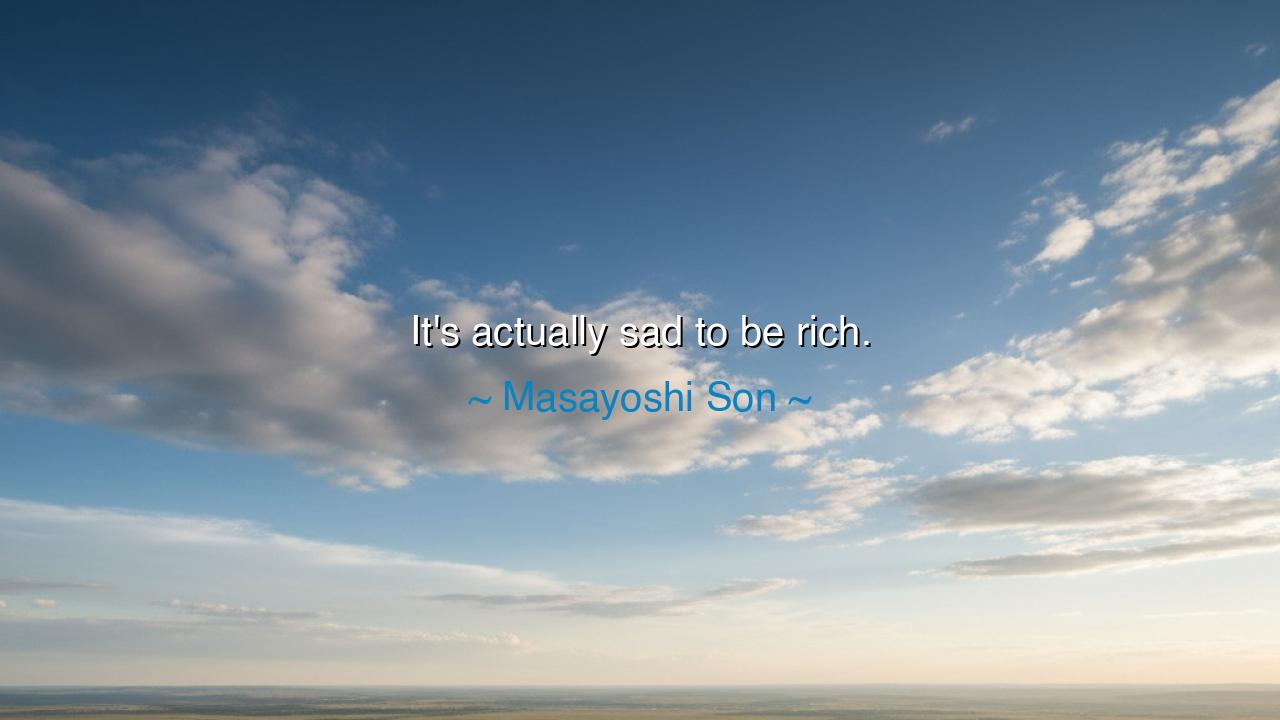
It's actually sad to be rich.






The words of Masayoshi Son, “It’s actually sad to be rich,” are at once startling and profound. To the ears of many, wealth is the summit of human striving, the answer to struggle, the crown of success. Yet Son, one of the wealthiest men of his age, pierces this illusion with a simple truth: riches may fill the purse, but they do not satisfy the soul. Beneath his words is the ancient wisdom that abundance of gold often brings scarcity of joy.
The origin of this confession lies in the life of Son himself. As the founder of SoftBank, he amassed fortune and renown through his vision of technology and investment. Yet in his ascent, he discovered what many before him have found—that the higher one climbs on the mountain of wealth, the lonelier the summit becomes. For riches can create walls rather than bridges, suspicions rather than friendships, obligations rather than freedom. What appears as victory from afar can, when reached, reveal itself to be a burden.
History confirms this paradox. Consider Croesus, the king of Lydia, once hailed as the richest man in the ancient world. His wealth dazzled nations, but it brought him no lasting peace. In the end, his riches could not save him from downfall, nor could they purchase the simple joys of contentment. Or think of Emperor Marcus Aurelius, who ruled the vast Roman Empire and commanded its treasures, yet confessed in his Meditations that true wealth lay not in possessions but in virtue and tranquility of spirit. Masayoshi Son stands in their company, repeating the age-old refrain: riches do not equate to happiness.
There is also sadness in wealth because it creates distance from others. The poor may dream of camaraderie in hardship, but the rich often fear whether love and loyalty offered to them are genuine, or merely masks worn in pursuit of gain. Friendships can be poisoned by suspicion, family bonds weakened by inheritance disputes, and the joy of simple pleasures drowned beneath the weight of constant responsibility. To be rich, then, is not always to be free—it can be to live in a cage, gilded though it may be.
Yet Son’s words are not only lament—they are warning and wisdom. They urge us to seek not only prosperity but also balance, humility, and gratitude. Riches in themselves are not evil, but the illusion that they can complete the soul is dangerous. True wealth lies in health, in love, in purpose, in the courage to live authentically. Without these, money becomes a heavy burden, an idol that consumes rather than nourishes.
The lesson here is clear: do not chase riches as the final goal of life. Pursue instead the treasures that endure—integrity, compassion, wisdom, and connection with others. If fortune comes, receive it as a tool to serve, not as a throne to rest upon. If it does not come, rejoice, for you are spared the burdens that Son himself calls “sad.” For the one who is content with little often lives more richly than the one who possesses much.
Practically, this means living with simplicity even in abundance. Use wealth, if it is given to you, not to build walls of luxury but to open doors of generosity. If you are poor, do not despise yourself, for you may already possess the greater riches of freedom, laughter, and true companionship. And for all, rich and poor alike, remember: joy is not purchased, it is cultivated.
Thus, Masayoshi Son’s words become not the complaint of a billionaire but a timeless teaching: to be rich in money is often to be poor in peace. Let us then measure wealth not by coins in the purse, but by the lightness of the heart, the depth of our love, and the steadiness of our soul. For these are treasures no sorrow can diminish, and no death can take away.






AAdministratorAdministrator
Welcome, honored guests. Please leave a comment, we will respond soon